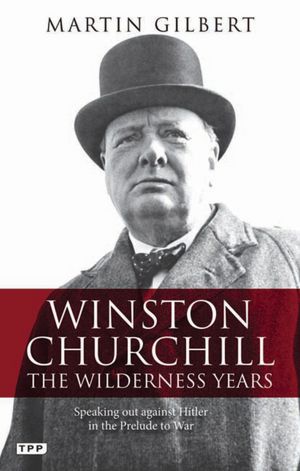 Martin Gilbert’s intimate knowledge of his subject and expert use of source material give us an important insight into the most influential British politician of the twentieth century. Reviewed by Mahon Murphy.
Martin Gilbert’s intimate knowledge of his subject and expert use of source material give us an important insight into the most influential British politician of the twentieth century. Reviewed by Mahon Murphy.
Winston Churchill: The Wilderness Years: Speaking out against Hitler in the Prelude to War. Martin Gilbert. IB Tauris. December 2011.
Anyone with even a passing interest in Winston Churchill will more than likely have heard of Sir Martin Gilbert. As Churchill’s official biographer he has authored numerous works on the man, most notably the monumental eight volume biography of Churchill. The Wilderness Years corresponds with the latter half of volume five, which is more positively subtitled Prophet of truth. Dealing roughly with the decade 1929 to 1939, where we find Churchill, after his term as Chancellor of the Exchequer, a backbencher, out of office, and seemingly out of favour.
In dealing with the period 1929 to 1931, the book presents Churchill coming to loggerheads with Stanley Baldwin over policy in India. Churchill declined Baldwin’s offer to make him secretary of State for India as he had “deep misgivings” (p19) about reform of the sub-continent. However, apart from some interesting insights into Churchill’s changing views on Gandhi, India remains in the background of this narrative linked to Churchill’s dislike of the government’s defence policies in that both “represented a weakening of British resolve” (p77). Churchill’s gaze was firmly fixed on the European mainland.
The blurb on the back of the back of the book would have the reader believe that this was the story of one man’s struggle to alert a government blinkered by pacifist policies to the dangers of Nazi aggression. In reality, Gilbert presents us with an intricate web of government ministers, civil servants and various other spies who used Churchill’s gifts for oratory and his position as elder-statesman to combat appeasement and the arms limitation policies, that were merely encouraging German expansion while at the same time weakening Britain’s bargaining position and its ability to defend itself.
To say Churchill was alone would be to discount the influence of those like Permanent Under-Secretary of State Sir Robert Vansittart, who remarked that it suited him much better to have Churchill out of office “for my information on German trends would at least be voiced” (p128). Churchill by 1936, far from being in the wilderness, was the focus of a new movement based around the Anti-Nazi Council whose aim was to bring together all the countries from the Baltic to the Aegean Coast (including the Soviet Union) to agree to stand by any victim of unprovoked aggression.
This, Churchill believed would “either ensure the peace of the world, or an overwhelming deterrent against aggression (p154). The amount of literature on Churchill is of course expansive and what Gilbert adds, which is missing from books such as RAC Parker’s Churchill and Appeasement, is the portrait of Churchill’s personal life which helps to underscore the public pressures he was under. His conviction that war was inevitable led him to intervene in his daughter Sarah’s romantic affairs. She was dating the Austrian born pianist Vic Olivier and was due to move with him to America in 1936. Churchill was adamant that any marriage was not to take place until after Olivier had secured American citizenship or else Churchill told his daughter “in three years you will be married to the enemy, and I will not be able to protect you.” Churchill’s belief in impending war and the fear of the chaos it would bring is underlined through these glimpses into his private life.
The first half of the book highlights the relationship between Churchill and his son Randolph who was just starting out on his political career. Randolph’s political decisions were to cause Churchill much public embarrassment. Randolph stood for parliament at the Wavertree by-election in February 1935. Randolph lost, and along with his father was much criticised in the media for having tried to break up the system of National Government. Churchill did not agree with his son’s idea to stand for election or his subsequent putting up of a British Union of Fascist member at another by-election in Norwood the same month. He did, however, support his son albeit due to a “father’s natural concern”.
Gilbert also discusses Churchill’s financial problems. While in the United States he had purchased a large block of American shares (£20,000 worth) on the eve of “Black Thursday.” This gives us the launching point for the book, where we find Churchill at home on his fifty-fifth birthday (30th November 1929) in financial disarray and on the verge of a breach with his party Churchill’s financial recovery through, his journalism, books, occasional betting and finally rescue by the industrialist Sir Henry Strakosch make for an interesting subplot into the main political events of the book. Gilbert’s intimate knowledge of his subject and expert use of source material give us an important insight into the most influential British politician of the twentieth century. Churchill’s agenda of opposition to the rearmed, aggressive Germany, opposition to the precipitate disarmament of the victors of the First World War, support for threatened states though the framework of the League of Nations, and the need for Britain to increase defence expenditure to preserve its system of democracy are all dealt with expertly.
Far from showing a man isolated in his prophetic fear of a second global conflict, Gilbert’s study shows Churchill in a minority, but certainly not alone. He was the focal point of efforts by the above mentioned, Vansittart, Sir Maurice Hankey and Ralph Wigram, to galvanise public opinion in favour of preparing for what they saw as the inevitable war with Germany. As Gilbert says, “Churchill’s efforts through the wilderness years had shown the importance of independent voices in a highly controlled political environment” (p8). Churchill, through his position, was able to bring concerns into the public arena that might otherwise have been drowned out in the mood of appeasement and pacifism of 1930s Britain.
——————————————————————————————
Mahon Murphy is a PhD candidate in the History department at the LSE where he also received his MA. His research is on German prisoners of war and civilian internees in the extra-European theatre of the First World War. His thesis looks at the treatment of European prisoners in a colonial context with a focus on the fall of the German colonies and protectorates in Africa, China and the Pacific. Read more reviews by Mahon.









2 Comments